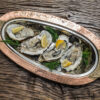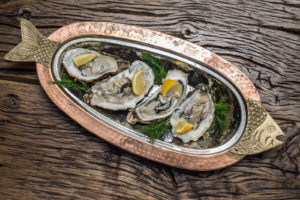
All About Copper Gluconate
Copper gluconate (or rather, just copper) is by no means a newly discovered mineral. Copper’s been popping up in everything from pipes to cookware for centuries. As studies surrounding the health benefits of copper gluconate become more involved and intricate, researchers are finding that it is much more than just a substance that coats our pennies.
Copper, as it turns out, is extremely important to the body. Even though your body only needs copper in trace amounts, deficiencies can cause vision loss and other harmful side effects.
Now before you go sticking a fistful of pennies into your mouth…don’t. Instead, read on to find out how your body can benefit from copper and some of our favorite ways of consuming the mineral.
Copper Gluconate: What Is It?
We should start by explaining that the copper that is found in your body is different from the one you’ll find on your saucepan. The difference is that copper gluconate is highly soluble in water, whereas the copper in your bathrooms pipes is obviously not.
You will only find this water soluble version of copper in your foods and supplements. Otherwise you’d be eating straight metal, and no human body could possibly benefit from that.
In its soluble form, copper has an enormous impact on your health. Deficiencies in this element create some pretty significant health issues.
Dangers of Deficiency
Because your daily recommended intake of copper is so low, deficiencies are very rare, but they can be caused by factors such as surgery, low vitamin B12 in the body, zinc toxicity, or hereditary factors.
Some symptoms of a copper deficiency are:
- Vision loss
- Fatigue
- Osteoporosis (and brittle bones)
- Anemia
- Weak immune system
- Pale or sickly looking skin
- Constant low body temperature
Doctors normally prescribe supplements for patients suffering from a copper deficiency. Though it’s unlikely you’ll ever experience a copper deficiency, being aware of it is important for your health and especially eye health. Our eyes are resilient but fragile. Even the smallest amount of copper missing can hurt our vision.
On the opposite side of the spectrum we have copper toxicity. Copper is toxic in high amounts, so don’t rush to add a straight copper supplement to your regimen unless you have a confirmed deficiency.
However, copper toxicity isn’t only a result of taking the wrong dosage of supplements. It can also occur when ingesting food that has been cooked in uncoated copper cookware or when there is high levels of copper in drinking water.
Generally, it is suggested that only 200 to 1200 mcg of copper should be consumed per day, depending on your age and other factors. Any more can result in kidney failure and possible death. One gram can be a sufficient amount to push your body over the edge. Be wary when considering your copper gluconate intake and always consult a doctor beforehand.
We don’t say this to scare you, but only to underscore the importance of doing your research and talking to your doctor before constructing your wellness regimen.
Copper Gluconate for the Eyes
That last section ended on a sort of scary note, but even making coffee in the morning can be scary if you aren’t careful. As long as you are careful about your copper intake, you’ll be fine.
Copper is a much needed mineral for the eyes. Like any well-oiled machine, the eyes need all the minerals and vitamins to work in harmony to be fully functional. That includes copper, even if it’s just a little bit.
One of the main benefits of copper gluconate is how it works to boost the connectivity within the tissues of the eye. This means that copper works to keep the pigmentation (and the melanin) in the eye will stay vibrant for longer, keeping your eyes bright and beautiful.
Beauty aside, copper gluconate has also been suggested to help prevent vision conditions such as age-related macular degeneration. Early research has even suggested that because of copper’s ability to improve connectivity between eye tissues, it may be a contender in treating myopia naturally.
Of course, as we spoke about before, a copper deficiency can mean loss of vision. Even if it had no other added benefits, you should monitor your copper intake to keep your vision clear and healthy.
Where Can You Find Copper Gluconate?
You can find the copper mineral in a variety of places, including mines. The largest copper mine is located in Utah. Mined copper is refined and purified to be used for pennies, cookware, pipes, and supplements.
On the consumable copper side, a very refined version of copper gluconate is best taken in supplement form for those with copper deficiencies. These supplements can either come in tablet and gel form or in drop form. You can take the tablets daily or add the drops to your drinks or meals.
Copper gluconate can also be found in our Ocu-Plus Formula. This formula will provide your eyes with all the necessary vitamins and nutrients needed for healthy eyes, including the trace amounts of copper that your body needs. When you take our carefully blended formula, you don’t have to worry about copper gluconate overdose.
Copper Gluconate-Rich Foods
Of course, supplements aren’t the only way to get copper into your diet. Food is the most natural and reliable source for vitamin and minerals! You can find copper in so many foods that you likely won’t have to worry about getting enough in your diet.
Everybody loves foods, so let’s take a look at the best foods containing copper gluconate:
 Liver (especially veal)
Liver (especially veal)- Seafood (especially oysters)
- Beans
- Cocoa and dark chocolate
- Sesame seeds
- Goat cheese
- Avocado
There’s a wide variety of foods to choose from, so even if you aren’t keen on liver (we don’t know too many people who are), maybe dark chocolate will be more enticing. If you incorporate healthy and diverse foods into your diet, you’ll have all the copper you need.
Copper gluconate is not just any mineral. It’s a mineral that will keep your eyes functioning and help prevent age-related macular degeneration. Copper can be found in almost every cell in the body. Though it is found trace amounts, it’s as important as any other vitamin or nutrient in the body.
Our Rebuild Your Vision Ocu-Plus Formula Contains All 17 Vitamins, Minerals, and Herbal Supplements to Improve Your Eye Health!












Thanks so much for all the info: Very appreciated. However, is not new research showing that Coconut oil is actually very good for us?